In the March 14, 2017 Ask The Headhunter Newsletter, we look at what some economists at the Federal Reserve say about jobs.
 Recent reports from the Federal Reserve suggest that switching jobs — and probably employers — is the best way to boost your salary and your career.
Recent reports from the Federal Reserve suggest that switching jobs — and probably employers — is the best way to boost your salary and your career.
In this special edition, we’ll explore what the Federal Reserve doesn’t know about recruiters, and why you should stay away from recruiters who waste your time with been-there-done-that jobs and lower salaries.
Are recruiters killing careers and the economy?
The best recruiters and headhunters boost employers’ productivity by finding discounted talent and up-and-coming talent to fill jobs those people may not have done before. By stimulating capable job candidates with new, motivating career challenges, insightful recruiters help create value for an employer — and boost our economy.
But untrained, inept recruiters lack insight and foresight. They don’t bother to understand an employer’s future needs or a job candidate’s untapped potential. They look for quick and easy “perfect matches” turned up by automated recruiting algorithms. These keyboard jockeys do little but process resumes whose key words match key words in job descriptions. They add no value. They kill career growth and job productivity.
Inept recruiters far outnumber good ones, and that’s killing our economy. Companies aren’t filling jobs with the best hires. But the fault lies with employers themselves, and with Human Resources executives, who buy — hook, line and sinker, and at enormous cost — the reductionist job applicant sorting systems that drive hiring today. (See Why HR should get out of the hiring business.)
New research and analysis from Federal Reserve economists reveals a problem of mismatches between workers, salaries and productivity, but fails to identify and discuss the structural cause of the problem — counter-productive recruiting.
The mad rush to fill jobs mindlessly
With the Department of Labor reporting lower unemployment and increasingly scarce talent, employers are rushing to fill jobs by relying on methods that yield staggeringly low signal-to-noise ratios.
By design, these systems actively solicit as many applicants as possible for each job. (Consider the applicant funnel ZipRecruiter, which exhorts HR managers to post a job on “one hundred-plus job sites.”) The ease with which these systems enable and encourage job seekers to apply for any job in a mindless feeding frenzy contributes to understandably low yields. Then HR managers, who fail to realize that more is not better, claim to be shocked and cry “talent shortage.”
When matches are made, they’re often undesirable to the candidate. It’s a common complaint among Ask The Headhunter readers: Employers want to hire you for a job only if you’ve done that job for three, four or five years already — and they’ll often pay you less. Even when they offer you a raise, the job is usually a lateral move. It’s not a career opportunity or a chance for you to hone new skills — it’s just an easy database match.
This seems to be much more than a job-seeker frustration. According to economists reporting from several branches of the Federal Reserve, it may be one of the causes of inflation and lower productivity. (See Bloomberg Businessweek: Job Switchers Solve An Inflation Mystery.)
But the economists don’t attempt to explain why employers are making such short-sighted, self-defeating hiring decisions — and I think it’s because the problem is so pervasive that it’s invisible. Although job seekers have long been very vocal and angry about it, the backdrop of reductionist, rude, automated recruiting across America seems to be such a necessary evil that no one but the job seeker sees or questions it. (See HR Technology: Terrorizing the candidates.)
The compelling need to fill jobs obscures the importance of planning to hire strategically and wisely — not just to fill round holes with round pegs quickly. American companies seem unaware of their mad rush to fill jobs mindlessly, and economists seem content to accept the prevalent recruiting infrastructure without reviewing it, simply because employers are content to keep paying for it.
This seems to be what the Fed’s economists don’t know about recruiters and the job market.
The failure is on the front line
Job seekers report wasting enormous amounts of time today fielding fruitless recruiting inquiries and participating in interviews for the wrong jobs. The question arises:
Why do employers look for perfect matches between workers and jobs?
The assumptions behind this quixotic search are incorporated into the ads that candidate vendors like Indeed, LinkedIn and ZipRecruiter run constantly:
- Employers must hire without training anyone or allowing time for a learning curve.
- Perfect hires are best.
- Talent can be had at a discount.
- Employers don’t have time to find talent on their own.
- Every job can be posted to “a hundred-plus” job boards instantly.
- “Big data” makes perfect hiring possible.
- More job applicants is better.
- And so on.
These assumptions push employers head-long into automated recruiting. But when we start questioning those assumptions, we’re left with the boots on the ground that create the biggest constraint on hiring the best talent: Inept recruiters on the front line.
When complex factors make it difficult to suss out what triggers the choices business people make, I get lazy. Though I’m not a scientist, I was trained as one, and I find that even if a problem seems complicated, it’s best to start with the law of parsimony: The simplest explanation is probably the right one.
If employers had better recruiters, they’d hire better people, increase productivity and stimulate the economy.
Yet, an employer’s first contact with an engineer, a scientist, a software developer, a machinist, an accountant — anyone the employer needs to hire — is through a person who is probably the least likely to understand qualities and characteristics that make the candidate the best one for the employer. It’s a person least likely to understand the work and the job. Except in rare, wonderful cases where employers have very good recruiters, it’s an incompetent recruiter.
Because employers believe they now have “intelligent applicant systems” at their disposal, many (I think most) dispense with highly trained and skilled recruiters. Employers on the whole have unsophisticated, untrained recruiters who quickly eliminate the best candidates because they’re rewarded for making the easy choices, not the best ones.
The Federal Reserve connects the dots between talent, pay and productivity
Bet you’ve been waiting to see how the Fed fits into this. Let’s dive in.
The job boards say employers can hire the best talent for less money because their databases are bottomless and the perfect candidate is in there, if you just keep looking.
But the Federal Reserve says higher productivity coupled with better career opportunities and higher salaries is better for everyone — and for the economy.
Consider the ambitious little Bloomberg Businessweek article referenced earlier, Job Switchers Solve An Inflation Mystery, that deftly puts the jobs puzzle together:
“Labor economists… are increasingly studying how job-hopping Americans drive compensation gains and affect the traditional interplay of low unemployment, wage gains, and inflation.”
It turns out those economists are now focused on what we already know: The surest way to get a big salary boost is to change employers and stretch yourself.
Consider this handful of factoids and data cited by Bloomberg, from economists at the Chicago Fed, the Atlanta Fed, the New York Fed, and the St. Louis Fed:
- “23 percent of employees are actively looking for another job on any given week, putting in four or five applications over a four-week period.”
- “Employers are poaching workers, as 27 percent of offers to the employed are unsolicited.”
- “Job switchers earned 4.3 percent more money in July 2016 than a year earlier, while people who remained in the same job enjoyed only a 3 percent increase.”
- “The so-called quit rate, a favorite indicator of [Fed Chair Janet] Yellen that measures voluntary separations from an employer… has almost recovered to levels seen before the recession of 2007-2009.”
- “Job-to-job changes and the threat of job-to-job mobility are strongly predictive of wage increases.”
- “Job switching is ‘a good sign for the economy’ and ‘an indication of dynamism,’ according to the [Atlanta] Fed’s [President Dennis] Lockhart.”
And note this nugget of gold in the Bloomberg story:
“While [St. Louis Fed economist David] Wiczer said that the bulk of wage hikes occur from job switching, he cautioned that the gains are highly cyclical, as the median job switcher didn’t reap much of a salary increase during recessions.”
What this means to you: With the economy shifting from recession to inflation, your best bet to make more money today is to switch jobs. I’ll stick my neck out and say that my reading of the Fed analysis — and my own experience and reports from Ask Headhunter readers — is that that you also need to switch employers if you want that dramatic pay increase.
But you can and should optimize that bet by making sure the next job you take also enables you to be more productive. Of course, recruiters sabotage that objective almost daily when they solicit you for jobs that would set your career back five or ten years.
Warning! Warning!
We already know that most recruiters love to stick you into a “new” job that’s not new at all. They don’t get paid to give you a chance at career development — or to help a manager hire for the future. They offer the same job you’ve been doing because you’re the least risky choice for them.
They pluck you from thousands of job applicants only when their database algorithms show that you’re already doing the exact job they’re trying to fill. There’s no need to train you. You will require no learning curve. You are the safest bet and, if you’re unemployed, the recruiter knows he can probably nab your desperate ass for less than you were earning at your last job because you need a job.
But that recruiter is dangerously naïve. The “perfect match” won’t increase productivity because you’re being plugged into the same job you were doing elsewhere, and your motivation is going to plummet along with your value.
Even if the new job pays more than your last one, this is a huge red flag for employers, warns Giuseppe Moscarini, a visiting scholar from Yale at the Philadelphia Fed:
“What we should worry about are wage raises for workers who stay on the same job and are not getting more productive.” [Bloomberg Businessweek]
Whether the “same job” is at the same employer or a new one, Moscarini suggests wage inflation without higher productivity seems to fuel inflation in the economy.
Recruiter failure
I don’t think employers or economists see the razor that’s cutting into productivity and economic growth. But it should be clear to any Ask The Headhunter reader.
It’s the recruiters.
Most recruiters look for an exact match of a resume to a list of key words in a job description. They’re not assessing job candidates to find value a competitor missed or the value an employer can leverage into higher productivity and profit over time. They tell managers to interview any candidates the automated recruiting system flashes on their displays.
Recruiters, who are an employer’s front line in the talent war, are generally not equipped to do their own jobs. They’re doomed to fail because they’re not really recruiting. They’re checking boxes on a database app. The result is hires that are less than optimally productive.
Job Seekers: Follow the money!
The Fed economists are offering job seekers and career-oriented workers a gift of tremendous insight, even if it seems obvious: Your smartest career move may be to switch jobs and employers.
Pursue only jobs that offer you substantially more money and require you to stretch your skills and capabilities — that is, to do more productive work that’s more profitable for you.
That strategy, they also suggest, may be best for employers and for the economy.
Smart workers don’t change jobs or employers without an opportunity to learn and develop new skills, to take on greater responsibility or authority, to stretch themselves — and to make more money. Those who accept been-there-done-that jobs do it reluctantly or because they feel they have no choice, especially if they’re unemployed.
The Fed tells us not only that lots (23%) of employees are actively looking for new jobs, but that competitors are trying to steal them away. Done for the right reasons and for the right opportunities, switching jobs and companies can pay off big. Employers give people who switch 40% higher raises than they give to people who stay where they are (4.3% vs. 3%).
So, follow the money. When a recruiter pitches you a re-run job for little or no extra money, suggest he go find a job he’s better at — because he’s not helping you or the employer. He could be killing your career and the economy. Has anyone told that to the Fed’s economists?
Did you get a better raise for staying in your job, or for switching out? What was the percentage? Did a recruiter move you into another same-old job, or help you advance your career? What’s your take on the Fed’s findings and conclusions?
: :


 I have your book,
I have your book,  Here are my two rules about salary disclosure:
Here are my two rules about salary disclosure: He was hoping to get a 10% salary bump. After a lot of assessment including talking with his references and having him talk with an industry expert whose opinion I respected, I knew he’d be great for a very different kind of job with my client.
He was hoping to get a 10% salary bump. After a lot of assessment including talking with his references and having him talk with an industry expert whose opinion I respected, I knew he’d be great for a very different kind of job with my client. To Employers:
To Employers: My new employer wants me to list in my LinkedIn profile that I’m working for her, and to include the company’s logo, but I’m still in the 90-day probationary period of my new business development job. I don’t want other employers to see it yet. She’s made no commitment to me, and besides, I still don’t have the private office or company phone she promised.
My new employer wants me to list in my LinkedIn profile that I’m working for her, and to include the company’s logo, but I’m still in the 90-day probationary period of my new business development job. I don’t want other employers to see it yet. She’s made no commitment to me, and besides, I still don’t have the private office or company phone she promised.
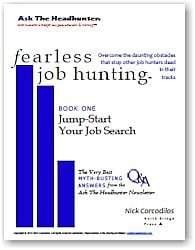
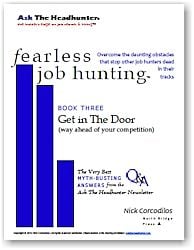
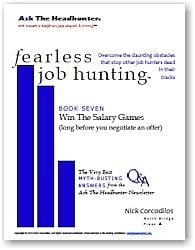
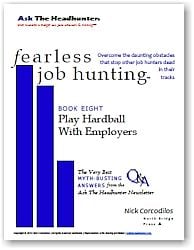




 I have been out of the corporate world for over 10 years. I recently sold my business and am contemplating my options. I am too young to retire (in my mid-50s), yet too old to be a hot prospect for most companies, so I am networking.
I have been out of the corporate world for over 10 years. I recently sold my business and am contemplating my options. I am too young to retire (in my mid-50s), yet too old to be a hot prospect for most companies, so I am networking. The best elevator pitch I’ve ever heard goes like this: “By doing XYZ, I can increase your profitability by 10%.” There’s the focus you mentioned — but to bring that kind of focus, you must first clearly see and examine the object. And that object is my business. Can you hack my business? (See
The best elevator pitch I’ve ever heard goes like this: “By doing XYZ, I can increase your profitability by 10%.” There’s the focus you mentioned — but to bring that kind of focus, you must first clearly see and examine the object. And that object is my business. Can you hack my business? (See 
 A credit card scam
A credit card scam
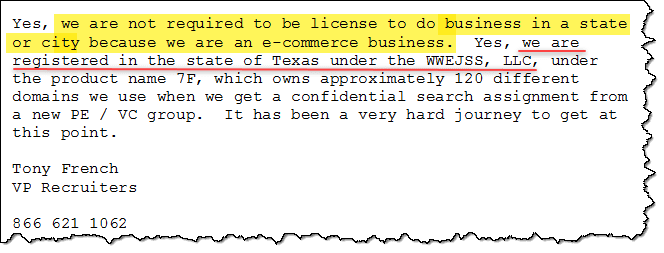
 Hunting… scammers, or deer?
Hunting… scammers, or deer?
 In this lawyer’s opinion, the fact that the contract calls the payment a “penalty” would probably invalidate any damages claim. What this — along with the other sloppy wording and writing in this “contract” — tells us is that a lawyer didn’t write it.
In this lawyer’s opinion, the fact that the contract calls the payment a “penalty” would probably invalidate any damages claim. What this — along with the other sloppy wording and writing in this “contract” — tells us is that a lawyer didn’t write it. Employers are so out of it that they’re not only putting up digital roadblocks against people they’re trying to attract — such as online application forms and
Employers are so out of it that they’re not only putting up digital roadblocks against people they’re trying to attract — such as online application forms and  This cannot be reconciled with the idea that an employer is trying to attract you. When you’re an abstraction in a database — a mess of keywords — the assumption is that you’re to be avoided and feared, either as a waste of time or, in this case, as a physical threat.
This cannot be reconciled with the idea that an employer is trying to attract you. When you’re an abstraction in a database — a mess of keywords — the assumption is that you’re to be avoided and feared, either as a waste of time or, in this case, as a physical threat.